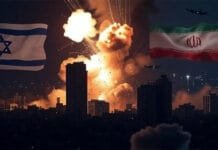INVC NEWS
Middle East – : Tensions across the Middle East are reaching critical levels as Israel intensifies its military campaign against Iran, drawing sharp warnings from powerful regional voices. Iraq’s top Shia cleric, Grand Ayatollah Ali al-Sistani, issued a stark statement cautioning that targeting Iran’s senior leadership could trigger widespread instability and ignite a full-scale war across West Asia.
Ayatollah al-Sistani’s remarks come amid a dramatic escalation in hostilities between Israel and Iran, which have been locked in direct confrontation for six consecutive days. The latest development follows Israeli Prime Minister Benjamin Netanyahu’s threat to go after Iran’s Supreme Leader, Ayatollah Ali Khamenei. Al-Sistani warned such an action would unleash “uncontrollable chaos” across the region.
Trump’s Threats Rejected as Khamenei Refuses to Surrender
Iran’s Supreme Leader, Ayatollah Khamenei, responded defiantly to renewed threats from former U.S. President Donald Trump, flatly rejecting calls to surrender or halt Iran’s nuclear ambitions. Trump, speaking from Florida, again hinted at military options against Tehran if diplomatic efforts fail. Iran, however, has made it clear it will not bow to pressure.
Meanwhile, India launched Operation Sindhu to evacuate its nationals stranded in Iran, highlighting growing fears of a broader regional conflict. Several Indian citizens have already been successfully airlifted from high-risk zones.
China Evacuates Citizens and Urges Ceasefire
China has evacuated more than 1,600 nationals from both Israel and Iran due to the escalating war. The Chinese Foreign Ministry confirmed the withdrawal and called for an immediate ceasefire between the warring nations. Beijing also condemned the recent threats made by Trump, stating that “intimidation and coercion have no place in international relations.”
China’s position aligns with its broader call for diplomacy and non-intervention, urging both sides to avoid further inflaming an already volatile situation.
Israel Labels Khamenei Responsible for War Crimes
Israeli Defense Minister Yoav Gallant declared that Ayatollah Khamenei would be held personally accountable for what he called “deliberate war crimes.” The comments follow the Iranian missile strike on Soroka Medical Center in Beersheba, which Israeli officials claim was a targeted attack on a civilian hospital.
Gallant accused the Iranian leadership of orchestrating strikes from deep within military bunkers, specifically directing attacks toward hospitals and residential areas. He said, “This is one of the most heinous war crimes in recent history, and Khamenei will face justice.”
Iranian Missile Hits Soroka Hospital in Southern Israel
A missile launched from Iranian territory struck Soroka Medical Center in the Israeli city of Beersheba. Although the full extent of the damage is still being assessed, the hospital has reported serious infrastructural impact. Additional Iranian missile activity has been confirmed across both central and southern Israel, with several towns and residential zones suffering collateral damage.
Israeli Airstrikes Hit Tehran and Nuclear Sites
Israeli air raids continued overnight, with precision strikes launched inside Tehran, according to military sources. Iranian state media reported that air defense systems were activated across central Tehran in response to incoming threats.
Israel has also urged civilians to evacuate from Arak and Khondab, where Iran’s heavy water nuclear reactors are located. These facilities are crucial to Iran’s controversial nuclear enrichment program, and their vulnerability raises concerns over potential fallout.
Gaza Suffers Heavy Casualties Amid Broader Conflict
As the Israel-Iran conflict escalates, Gaza has once again become a secondary battlefield. Israeli airstrikes on a residential building in Gaza City’s Zeitoun neighborhood reportedly left over 100 Palestinians injured, according to medical sources from Al-Aqsa and Al-Awda hospitals.
Additional assaults were carried out near Nuseirat, a densely populated refugee area in central Gaza, resulting in at least 16 fatalities and dozens more wounded. Reports from local media outlets indicate that strikes were focused around Gaza Bridge and surrounding military compounds operated by Hamas.
Public Sentiment in Israel Shifts Toward War
A growing majority of Israel’s Jewish population now supports military action against Iran. A recent survey revealed that 83% of Jewish Israelis are in favor of direct strikes on Iranian targets. Former Defense Minister Avigdor Lieberman, known for his hardline stance, praised Netanyahu’s strategy, stating it was “long overdue.”
Lieberman had previously resigned from the Cabinet over disagreements related to Gaza policies but has now reemerged as a vocal supporter of aggressive action against Tehran. Former military chief and ex-minister Benny Gantz, who stepped down over past Gaza conflicts, also endorsed the current escalation, calling it a matter of right and wrong.
Prime Minister Netanyahu reportedly gave the order for direct strikes on Iran’s nuclear infrastructure last Friday, intensifying fears of a regional war that could draw in multiple nations across the Middle East.
















